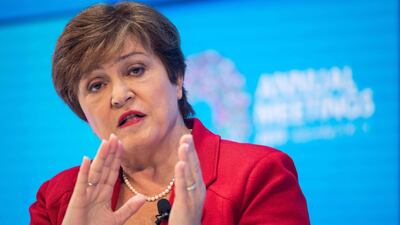The EU’s economic recovery is “highly uncertain” because its handling of Covid-19 and the vaccination programme has caused inequality to grow both across and within countries, International Monetary Fund chief Kristalina Georgieva told a online seminar on Monday.
The Washington-based lender expects the EU to grow by 4.2 per cent this year. However, Ms Georgieva said her greatest concern is that “the great lockdown of 2020” could morph into “a great divergence in 2021”, with poorer countries losing out, including Europe’s traditional tourist destinations.
“Divergence is most profound in the developing world where half of the countries that used to catch up in income levels with their wealthier peers are now falling further behind,” Ms Georgieva told delegates attending the European Semester Inter-Parliamentary Conference on Stability, Economic Co-ordination and Governance in the EU. "But it is a risk for the EU as well.”
The IMF chief said traditional tourist destinations such as Spain, Greece and Italy suffered much sharper contractions of more than 9 per cent, higher than the 6.4 per cent decline recorded across the EU.
“We project that by the end of 2022, per capita income for the emerging markets of Central and Eastern Europe will be 3.8 per cent below pre-crisis projections, compared to a shortfall of just 1.3 per cent for the EU’s advanced economies – a negative impact almost three times larger that will slow the pace of convergence,” said Ms Georgieva.
Last month, the IMF revised its 2021 growth estimate for the global economy to 5.5 per cent, 0.3 per cent higher than the fund's estimate in October, on the back of the Covid-19 vaccination drive and support measures put in place by the world's largest economies.
That follows last year's 3.5 per cent contraction that brought the travel industry to a standstill, disrupted trade and led to lockdowns around the world that raised unemployment and poverty levels.
“In 2020, 90 per cent of countries finished the year with a smaller economy than at the start of it — the worst performance the world has had during peacetime,” said Ms Georgieva.
To tackle the threat of divergence in the EU’s economic recovery and around the globe, Ms Georgieva set out a three-point plan to help policymakers ensure a strong recovery.
Her first suggestion is to “end the health crisis” by placing vaccine campaigns at the heart of economic policy.
“Until we defeat the pandemic everywhere, we risk new mutations that threaten our progress. Scaling up production and distribution of vaccines are critical. So, too, is additional financing to secure doses and pay for logistics, as well as timely reallocation of excess supplies,” she said.
Her second suggestion is to “fight the economic crisis” by ensuring that support for companies and households continues “until the pandemic is defeated”.

The eurozone economy contracted less than expected during the fourth quarter of 2020, declining by 0.6 per cent from the previous quarter, while unemployment was flat at 8.3 per cent, partly protected by government programmes that pay the wages of furloughed workers.
Meanwhile, the European Central Bank kept interest rates and its stimulus package unchanged in January, with ECB president Christine Lagarde holding the pandemic bond-buying programme at €1.85 trillion ($2.24tn) after a €500bn boost in December.
Ms Georgieva praised Ms Lagarde and the ECB “for reacting swiftly with extraordinary policy accommodation”, and said while now is not the time to withdraw support, it is the right time to assess the “strength of insolvency regimes”.
“Gradual withdrawal has to follow, not precede, a durable exit from the health crisis. It matters internally, and also in terms of spillovers — a premature tightening of policy when worse-hit economies are still deeply fragile could exacerbate divergence between countries,” she said.
While support programmes led to lowerv-than-average bankruptcies last year, there remains a risk of a higher rate of debt defaults once that support declines.
“Insolvency arrangements and greater emphasis on equity support could help prevent debt overhangs and ratcheting bankruptcies,” said Ms Georgieva.
Her third suggestion is for policymakers to hasten the shift to digitisation and "greening" of the economy.
A co-ordinated green infrastructure investment push could boost global gross domestic product by more than 0.7 per cent annually over a 15-year period, according to the IMF, creating millions of new jobs.
“The Next Generation EU [fund] can be more than a catalyst for economic transformation: it can be a forerunner to new shared fiscal tools to complement the ECB’s single monetary policy,” said Ms Georgieva.
The IMF has provided $105bn in new financing to 85 countries since the crisis began, including to the European nations of Albania, Bosnia and Herzegovina, Kosovo, Moldova, Montenegro, North Macedonia and Ukraine.
Ms Georgieva said the lender is now working closely with the EU to do more for low-income countries that “face painful choices between tackling the health crisis, meeting peoples’ basic needs and fostering macroeconomic stability, and boosting public investment that is essential for sustainable growth”.
She lauded the EU’s efforts to help vulnerable countries during the crisis and, in reference to Britain’s exit from the bloc on December 31, said the EU was “one of the best inventions of the 20th century”.
“Its values of solidarity and inclusion remain the 21st century’s best hope,” said Ms Georgieva.


